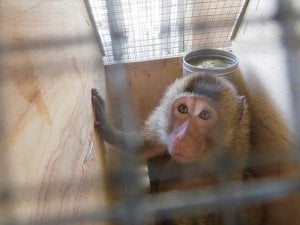PETA Discovery: Charles River Plans Largest Monkey Facility in U.S., Housing 43,000 Primates
For Immediate Release:
January 2, 2024
Contact:
Tasgola Bruner 202-483-7382
PETA has uncovered plans by Charles River Laboratories, the largest importer of monkeys used for laboratory experiments, to build the largest monkey-holding facility outside Asia—capable of housing 43,000 primates—and the company is pursuing construction on ecologically sensitive land in Texas despite the objections of local residents and elected officials.

Credit: PETA
In March, Charles River purchased 500 acres bordering land owned and protected by The Nature Conservancy, the U.S. Fish & Wildlife Service and the San Bernard National Wildlife Refuge. It did so under a different company name and hasn’t disclosed the plans publicly.
PETA joined with local residents who came out in force against the plans, moving the Brazoria County Board of Commissioners on November 28 to unanimously adopt a resolution recommending that state and federal authorities not issue the needed environmental permits to Charles River. Documents obtained by PETA show that other county personnel have met with company representatives and have known the extent of the plans for months.
“Charles River is proposing the largest ethical, environmental, and scientific catastrophe in American history,” says PETA primate scientist Dr. Lisa Jones-Engel. “PETA applauds Brazoria County officials for taking steps to block this dangerous plan and urges federal and state authorities to do the same.”
The current largest monkey-holding facility—owned by Envigo and located in Alice, Texas—confines 6,000 to 11,000 monkeys. It creates an estimated 22,000 gallons of liquid waste per day. The facility was built to handle only a third of this amount, so the company hauls up to 16 truckloads each day to a wastewater site in Austin. By contrast, Charles River’s proposed facility would produce an estimated 100,000 gallons of liquid waste every day, posing a major risk of environmental damage to the federally protected salt marshes, lakes, and coastal prairies that border the property.
The proposed facility would introduce monkeys’ saliva, blood, and other bodily fluids into the environment. Monkeys used by the experimentation industry are known to carry and transmit a slew of nasty pathogens and diseases, including herpes B virus, tuberculosis, Ebola-like viruses, simian hemorrhagic fever virus, shigellosis, salmonellosis, Campylobacter, malaria, and dengue. There’s also a risk that monkeys could escape, which has happened at other primate laboratories in Texas.
Charles River is currently under civil and criminal investigation by the U.S. Department of Justice for violations of the Endangered Species and Lacey acts. The company also recently acknowledged that it’s under investigation by the Enforcement Division of the U.S. Securities and Exchange Commission related to its sourcing of monkeys from Asia.
PETA—whose motto reads, in part, that “animals are not ours to experiment on”—opposes speciesism, a human-supremacist worldview. For more information on PETA’s investigative newsgathering and reporting, please visit PETA.org, listen to The PETA Podcast, or follow the group on X (formerly Twitter), Facebook, or Instagram.


